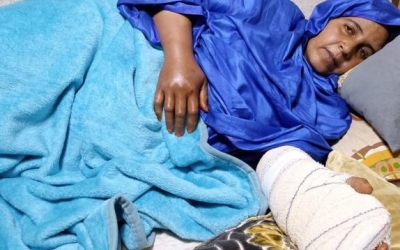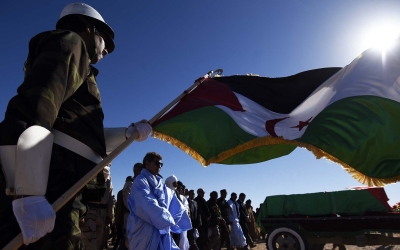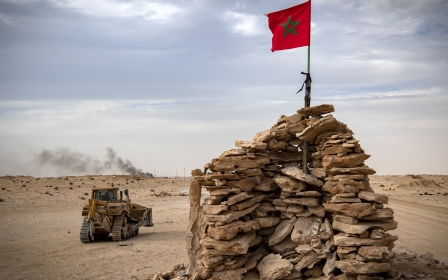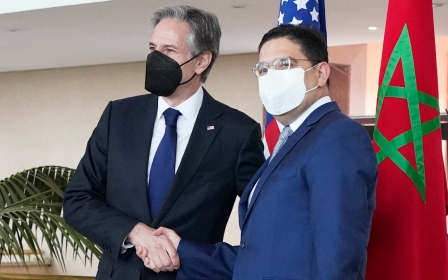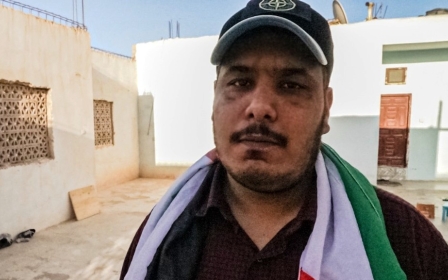Sahrawi activist enlists Americans to stop police beatings and sexual assault
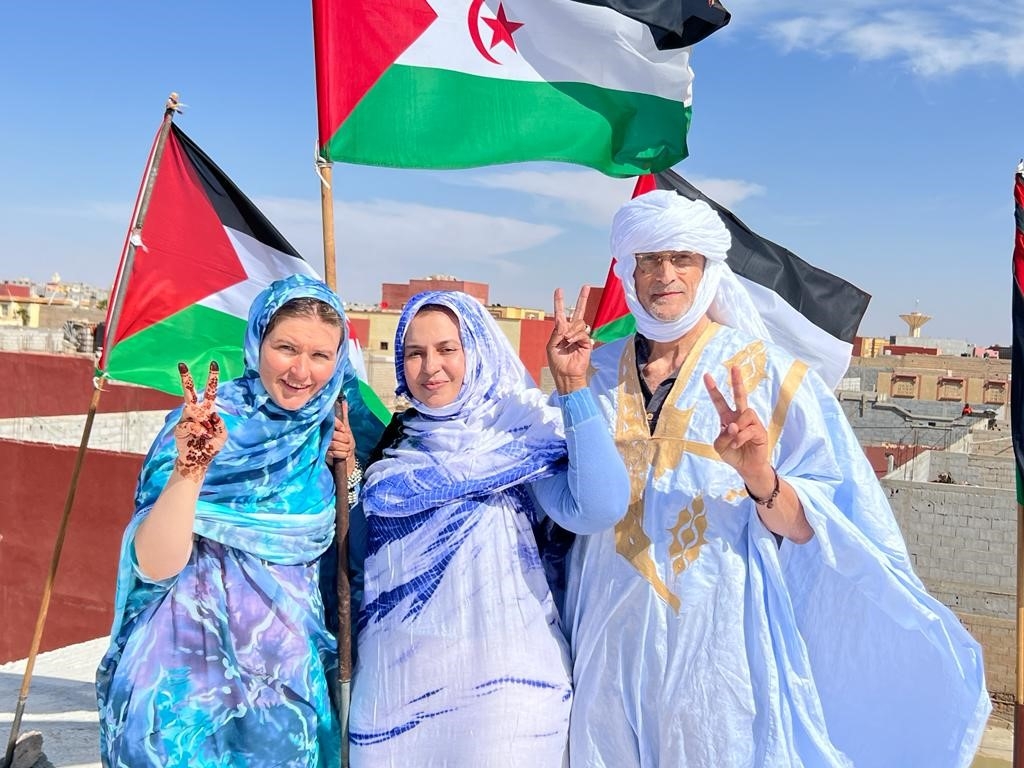
Sultana Khaya has suffered heavily for her cause.
A campaigner for the rights of the Sahrawi people and a native of the Western Sahara city of Boujdour, she - as well as her relatives - has faced repeat violence at the hands of the Moroccan police.
She has been raped, and threatened with rape, by policemen multiple times, as have her sister and elderly mother.
'The delegation came to report about the situation, because Morocco keeps lying about our struggle and giving misunderstandings about it'
- Sultana Khaya, Sahrawi activist
Since November 2020, she has been under effective house arrest after a breakdown of a ceasefire between Morocco and a Sahrawi nationalist group led to a wider crackdown on activists in Western Sahara.
After spending months of what she describes as a state of "siege" in her home and enduring repeated invasions by police, Khaya and other local activists put out a call for Americans sympathetic to her cause to come and break the siege on her house, reasoning that Moroccan police would be less inclined to attack those protected by US passports.
New MEE newsletter: Jerusalem Dispatch
Sign up to get the latest insights and analysis on Israel-Palestine, alongside Turkey Unpacked and other MEE newsletters
"We called many times for a delegation to come to report on our situation," said Khaya, speaking to Middle East Eye from her home via phone.
"Morocco uses a lot of propaganda against us as the Sahrawi people... the delegation came to report about the situation, because Morocco keeps lying about our struggle and giving misunderstandings about it."
Since 16 March, Khaya has been living alongside Tim Pluta, an Irish-American military veteran, and Ruth McDonough, a British-American schoolteacher, who managed to get to her home following several failed attempts by other activists.
They planned to stay for a week, but more than a month has now passed after they realised that the police weren't moving in on them.
McDonough said she had been working at a school in London when she got a call from an activist contact about Khaya's situation.
"What they literally said is we need American passport holders who speak Arabic and have a week off," she told MEE.
The presence of the Americans has seen the repeated violence and sexual assault meted out against Khaya end.
None of them can leave Khaya's home, which is constantly watched by Moroccan police, but it has allowed friends and neighbours to visit and prevented further escalation, allowing Khaya to continue campaigning, including staging demonstrations from the roof of her home.
"The rapes have stopped because we're in the house," said Pluta, who had kept his identity secret until speaking to MEE.
"Morocco has such a close relationship with the United States, and the United States supplies Morocco with not only finances, but military equipment and advisors."
Morocco's relationship with the US stretches back to 1777, when the kingdom was the first country to recognise the newly independent nation. The two have enjoyed strong trade and military ties for decades.
Consular warning
On Tuesday, McDonough and Pluta received a warning from US consular officials in Morocco that they needed to leave of their own accord or face arrest and maybe criminal charges by the kingdom.
The activists believe the warning is likely a bluff, and McDonough said on Wednesday that she was starting a hunger strike.
Though they are not party to any specific plans by activists either in Western Sahara or abroad, the trio hope more foreign volunteers would replace them should Morocco follow through on its threats to remove them.
Video from 16 February 2021 shows Sultana Khaya's sister Waara being dragged from their house by Moroccan police (Sultana Khaya)
But Khaya and the others dread the Moroccan security services' likely retaliation should the Americans be forced to leave.
Without daring to touch Khaya, the police have over the last month harassed, arrested and attacked other Sahrawi activists in the city (largely women) and warned them against visiting Khaya's house or showing support.
"They tell the women, 'you wait until the Americans leave and what we did to Sultana and her sisters and her mother - we're going to do that you, too,'" said Pluta.
"The only reason they've stopped is because we're US citizens, and Morocco and the US are in bed so tightly together that they won't risk losing US support."
American power
Spain controlled the area now known as Western Sahara until 1975, when it relinquished control to Morocco and Mauritania. Following several years of conflict between the two countries and the Algeria-based Sahrawi nationalist Polisario Front, Mauritania withdrew its claim to the territory in 1979.
Since a 1991 ceasefire, two-thirds of Western Sahara is now controlled by Morocco, while the other third is controlled by the Polisario Front, recognised by the UN as the legitimate representative of the Sahrawi people.
No country recognised Moroccan sovereignty over Western Sahara until November 2020, when outgoing US President Donald Trump recognised the kingdom's claim in return for Morocco normalising ties with Israel.
'The rapes have stopped because we're in the house'
- Tim Pluta, American activist
Despite widespread criticism of this break with longstanding US foreign policy, the Biden administration has shown no indication that it plans to reverse Trump's move, while US State Department documents appear to show Western Sahara as part of Morocco.
Both McDonough and Pluta noted the irony of using their passports in support of Western Sahara activists considering the apparent willingness of the US to turn a blind eye to Morocco's colonisation of the region - both examples of how powerful American influence could be.
She said that she had researched the principle of Unarmed Civilian Protection, a method used by solidarity activists in Palestine, Iraq, South Sudan and elsewhere in the world to prevent attacks on civilians facing threats of violence.
Initially, she was concerned about the risk of being seen to fit into a "white saviour" complex.
"Responding to a request to use our American citizenship as a shield does and doesn't reinforce the same patterns of violence that the Khayas are experiencing on their bodies," she said.
"The same system that's protecting them while we're here is a concern for us as being more precious and more human than they are - and it's the American power behind that that's also supporting Morocco to do this."
MEE has contacted the Moroccan government for comment.
Peaceful resistance
Khaya's approach to resistance to the Moroccan occupation stands in contrast with the Polisario Front.
In November 2020, the ceasefire which had held since 1991 collapsed just a month before the US recognition of Moroccan sovereignty. Since then there has been sporadic fighting between the two sides.
Despite the relentless abuse meted out to her and her comrades, Khaya has staunchly stuck to principles of non-violence.
"We still believe in a peaceful process even though the ceasefire stopped. In 2007 I lost my eye and they sentenced me to eight months in jail, but this never stopped me," she explained, referencing a blow from a police truncheon at demonstration that cost her half her sight.
"We want more protection and more visits from people to report about our situation to see more directly and under what conditions were are living."
"They beat us. They tortured us. But this never stopped me.
"We are struggling, we will continue struggling to achieve our purpose - which is independence."
This article is available in French on Middle East Eye French edition.
Middle East Eye delivers independent and unrivalled coverage and analysis of the Middle East, North Africa and beyond. To learn more about republishing this content and the associated fees, please fill out this form. More about MEE can be found here.


